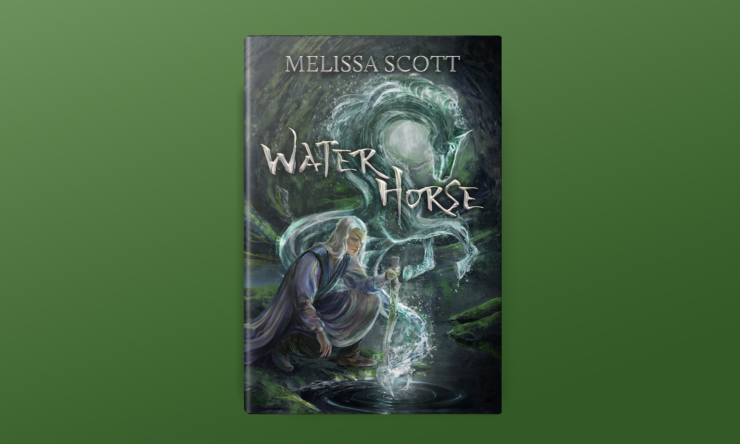Melissa Scott’s career spans, at this point, four decades. Perhaps best known for her Astreiant fantasy novels (initially written with her late partner Lisa A. Barnett, and later alone), she’s also written innovative science fiction, space opera, and tie-in novels for Stargate and gen:Lock. Her most recent original novel, the space opera Finders, came out from small press Candlemark and Gleam: a vivid and lively novel full of character and intrigue.
Now with Water Horse (Candlemark and Gleam, June 2021) Scott returns to fantasy with a self-contained volume of war, weirdness, and people strained to their breaking point by a generations-long war.
Every spring, the Riders, under the command of their lord paramount, cross the sea from Manan to Allanoth and attempt to conquer the kingdoms there: Riverholme, the Westwood, and the Hundred Hills. The Riders follow the rule of the Blazing One, a god whose most devout followers abide no competition, and whose customs are at odds with the more permissive ways of the lands of Allanoth. The rites of the Blazing One, and their priests, the wheelmen, have been spreading in the riverlands and the nenns—fortified holdings cut into the stone of the mountainsides—of the Hundred Hills, in part because among their divine gifts is the ability to heal, which is not given to the followers and servants of the other gods in Allanoth.
This is a land where magic is… not commonplace, but widespread: the kyra of the Westwood can speak to the forest; the arros of the Hundred Hills is skilled in manipulating water and illusion; a harper is bound and protected by oaths on their harp, and the harp itself will avenge their murder; weather-wyrds can work the weather; and omens and portents are as much a part of the world as war and rain.
Esclin is the arros, the king, of the Hundred Hills, and lord of Nen Elin, the greatest of the hill nenns. A prophecy given in autumn says that the day a wheelman enters Nen Elin is the day the nenn falls, and other omens are poor for his future. Water Horse opens with his attempted assassination, and the reader swiftly learns that the Riders from Manan are overwintering in Allanoth, the better to launch a swift and devastating campaign in the spring. The novel spans less than a year, from late autumn to late spring, a dense and richly atmospheric tapestry of multiple characters faced with conflicts of loyalty and honour, with differing cultural mores and with personal sacrifice.
Water Horse defies easy description as a novel. Its large ensemble cast wouldn’t be out of place in a much larger story, a trilogy or a series, but even within a single volume, each individual is compellingly drawn—from Esclin Arros and Viven Harper to Talan, Esclin’s heir, and Kelleiden Smith, Esclin’s most frequent lover, and from Alcis, the kyra of the Westwood, to Leicinna, the captain of a small troop of mercenary cavalry. At times, Water Horse feels like a family saga, a story of relationships: they mostly all tangle back around to Esclin, as the central point around which Water Horse turns, his lovers, his friends, his enemies, his connections.
For all that it’s self-contained, Water Horse feels like a single episode from a much longer history. Scott’s complicated world fills up space, spills off the edges of the page into uncharted territory. It feels real, satisfyingly deep—and at the same time, those tantalising hints of other stories, other histories, made me intensely curious for more.
I read Water Horse in a single afternoon’s sitting, in a year in which I’ve frequently struggled to finish novels, or even start them at all. Deft and atmospheric, with Scott’s trademark elegant prose, Water Horse is an engaging delight. I can recommend it highly.
Liz Bourke is a cranky queer person who reads books. She holds a Ph.D in Classics from Trinity College, Dublin. Her first book, Sleeping With Monsters, a collection of reviews and criticism, was published in 2017 by Aqueduct Press. It was a finalist for the 2018 Locus Awards and was nominated for a 2018 Hugo Award in Best Related Work. She was a finalist for the inaugural 2020 Ignyte Critic Award, and has also been a finalist for the BSFA nonfiction award. Find her on Twitter. She supports the work of the Irish Refugee Council, the Transgender Equality Network Ireland, and the Abortion Rights Campaign.










